Trump’s suggestion for Egypt and Jordan to take in Palestinians from Gaza is likely to face rejection due to historical, security, and political concerns. Both countries worry about the implications of permanent resettlement on regional stability and the Israeli-Palestinian conflict. Their previous stances indicate a commitment to preserving their countries’ integrity while aiming for a Palestinian state.
Former President Donald Trump’s proposition for Egypt and Jordan to accept Palestinians displaced from Gaza is likely to face significant resistance. The leaders of both nations are likely to reject the plan due to historical context, security concerns, and the implications of such an action on the Israeli-Palestinian conflict.
Trump’s suggestion arose amidst a humanitarian crisis in Gaza, characterized by extensive destruction, where he mentioned relocating displaced populations to enable a fresh start. However, the notion of moving Gaza’s population is fraught with complexities, particularly given the fear of permanent resettlement without the option to return.
The historical backdrop is critical, as the displacement of Palestinians has roots in conflicts stemming from the 1948 war and the 1967 annexation of territories by Israel. A new wave of displacement during the ongoing conflict is viewed by many Palestinians as a continuation of this historical tragedy, or Nakba, raising concerns about their rights and identity.
Egypt and Jordan have previously rejected resettlement discussions, insisting on a Palestinian state that encompasses the occupied territories. The leaders of these countries worry that accepting refugees could undermine their own national stability and the broader effort for a lasting resolution to the Israeli-Palestinian conflict.
Furthermore, both nations face their own challenges, including hosting millions of migrants and refugees. Any influx of Palestinian refugees could exacerbate existing tensions and alter the demographics in these countries, potentially leading to social upheaval.
Trump’s ability to compel Egypt and Jordan into accepting refugees largely hinges on the political will of both nations, especially considering the historical and social ramifications. Leverage through U.S. economic measures may backfire, alienating crucial allies in a volatile regional landscape.
Ultimately, the prevailing sentiment among officials in Egypt and Jordan underscores a commitment to preserving their national integrity while supporting Palestinian statehood ambitions. The ongoing conflict requires a delicate balance of humanitarian support and respect for national sovereignty.
In conclusion, Trump’s proposal is unlikely to gain traction, as both Egypt and Jordan prioritize their respective security and political stability, viewing mass displacement of Palestinians as counterproductive to peace efforts in the region.
The Israeli-Palestinian conflict has a long and complex history with numerous displacements of Palestinians, particularly during wars in 1948 and 1967. The population displacements continue to be a focal point in discussions surrounding peace processes. Palestine’s claim to land primarily centers on the right of return for refugees, while Israel’s stance is that surrounding Arab nations should absorb those displaced. Trump’s recent suggestion comes during a current humanitarian crisis in Gaza, complicating the historical narrative and region’s political sensitivities. Both Egypt and Jordan, having signed peace treaties with Israel, support a two-state solution and are wary of changes that might occur due to the permanent displacement of Palestinians. President Sissi of Egypt has publicly expressed concerns about the national security implications this could have for Egypt, while Jordan grapples with its own substantial Palestinian refugee population and political stability issues.
In summary, the likelihood of Egypt and Jordan accepting Palestinian refugees from Gaza is minimal due to historical, political, and security considerations. The potential for destabilization and past experiences with refugee crises further solidify their positions against such plans. Both nations remain committed to Palestinian statehood and their own national interests, emphasizing a cautious approach amidst an ongoing humanitarian crisis in Gaza.
Original Source: apnews.com




